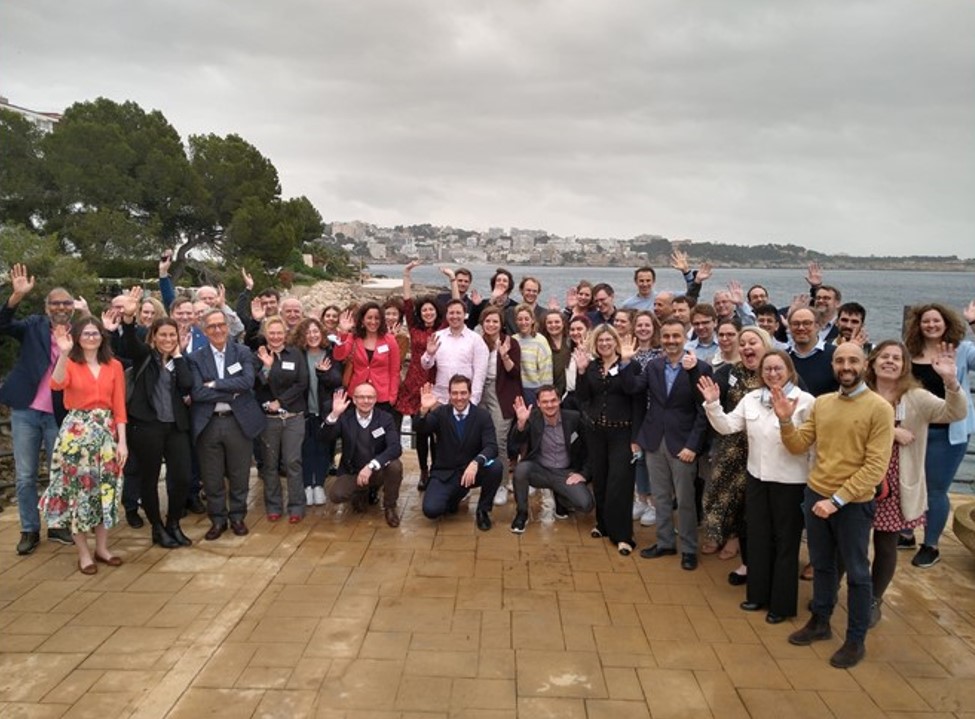Menu

Before the start of the General Assembly meeting, a hands-on workshop on paper writing was organized for early carreer researchers to work on the preliminary draft of 12 articles that were presented to the rest of participants on day 3. Jonel Trebicka, Coordinator of the MICROB-PREDICT project, welcomed all participants in the official opening session of the General Assembly. Maria Papp, Professor at University of Debrecen, Hungary, presented an overview and progress on the clinical, genetic, expositional and geographical characterization of existinf data (WP1). Michael Kuhn, Staff Scientist at the European Molecular Biology Laboratory, Germany, presented results from gut microbiome metagenomics and metatranscriptomics analyses of a cohort of patients with cirrhosis (WP2). Next, Florian Schober, postdoctoral researcher at the Max Plank Institute for Biochemistry, Germany, presented the results from the proteomics and metabolomics analyses of host and microbiome from the study cohort (WP3). Later, Mani Arumugam, Associate Professor at University of Copenhagen, Denmark, and Michael Kuhn, provided an update on data management, integration and systems modeling (WP4), and presented results on potential biomarkers for albumin and riflaximin treatment associated with progression of cirrhosis into ACLF. The validation of candidate biomarkers and sensor’s development (WP5) was discussed by Christophe Junot, Head of Department at the French Alternative Energies and Atomic Energy Commission, France. Sabine Klein, postdoctoral researcher at Goethe University Frankfurt, Germany, presented the results from the in vivo experimental validation of previously identified biomarkers (WP6). At the end of day 3, Aleksander Krag, Head of the Hepatology Department at Odense University Hospital, Denmark, discussed the clinical validation of signature-guided interventions in the context of the future clinical trial (WP7).
On the last day, Itziar de Lecuona, Deputy Director of the Bioethics and Law Observatory at University of Barcelona, Spain, presented the implications of the joined data controllership agreement (WP8). Minneke Coenraad, Gastroenterologist and Hepatologist at Leiden University Medical Center, The Netherlands, presented an overview of completed and ongoing communication and dissemination activities as well as a portfolio of training opportunities for early career researchers in participating centers. At the end of day 4, Benjamin Lelouvier, Scientific Director at Viomer, France, and Marko Korenjak, President of the European Liver Patients’ Association (ELPA) , Belgium, on behalf of the Impact Board shared their insights on the motivations behind the project and reviewed the dissemination strategy. The meeting ended with the valuable feedback from the Scientific and Ethical Advisory Board and final discussion and wrap-up by Trebicka.
This study received funding from the European Union’s Horizon 2020 research and innovation programme under grant agreement no. 825694.
The EU-funded MICROB-PREDICT project aims to investigate the interplay between gut and liver and their interaction with the gut microbiome. The MICROB-PREDICT Consortium will identify microbiome-based biomarkers associated with end-stage liver disease and generate data from large patient cohorts. Collectively, this information will enable accurate patient stratification and pave the way for new personalized therapies.
ClinicalTrials.gov Identifier: NCT05056220
The European Foundation for the Study of Chronic Liver Failure (EF Clif) is a private nonprofit organization which mission is to promote research and education in hepatic chronic failure with the aim to contribute to improving the quality of life and to increase the survival of patients with liver cirrhosis. Since its foundation in 2009, the European Association for the Study of the Liver (EASL) Chair supports research activities through the EASL-CLIF Consortium, a network of more than 100 European university hospitals and more than 170 clinical researchers. The Grifols Chair promotes translational studies across centers throughout Europe and North America within the framework of the European Network for Translational Research (ENTR) with 25 centers and more than 40 investigators.
European Foundation for the Study of
Chronic Liver Failure
Avinguda Diagonal 477, 11th floor
08036 Barcelona, Spain
Tel: +34 93 227 14 00
Email: Send us an email
© 2025 European Foundation for the Study of Chronic Liver Failure

| Cookie | Duration | Description |
|---|---|---|
| cookielawinfo-checkbox-analytics | 11 months | This cookie is set by GDPR Cookie Consent plugin. The cookie is used to store the user consent for the cookies in the category "Analytics". |
| cookielawinfo-checkbox-functional | 11 months | The cookie is set by GDPR cookie consent to record the user consent for the cookies in the category "Functional". |
| cookielawinfo-checkbox-necessary | 11 months | This cookie is set by GDPR Cookie Consent plugin. The cookies is used to store the user consent for the cookies in the category "Necessary". |
| cookielawinfo-checkbox-others | 11 months | This cookie is set by GDPR Cookie Consent plugin. The cookie is used to store the user consent for the cookies in the category "Other. |
| cookielawinfo-checkbox-performance | 11 months | This cookie is set by GDPR Cookie Consent plugin. The cookie is used to store the user consent for the cookies in the category "Performance". |
| viewed_cookie_policy | 11 months | The cookie is set by the GDPR Cookie Consent plugin and is used to store whether or not user has consented to the use of cookies. It does not store any personal data. |